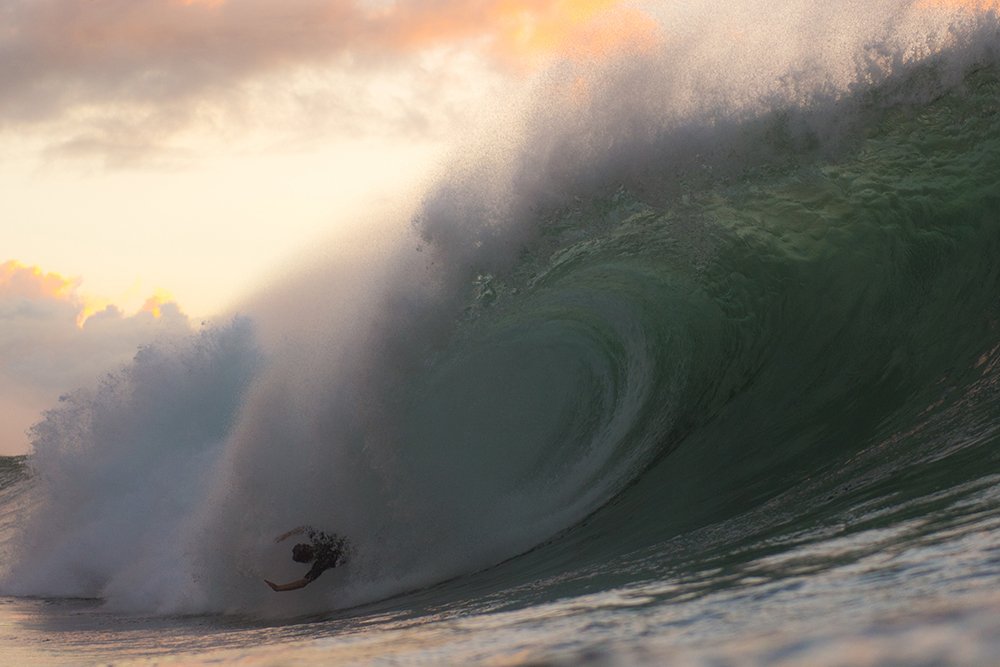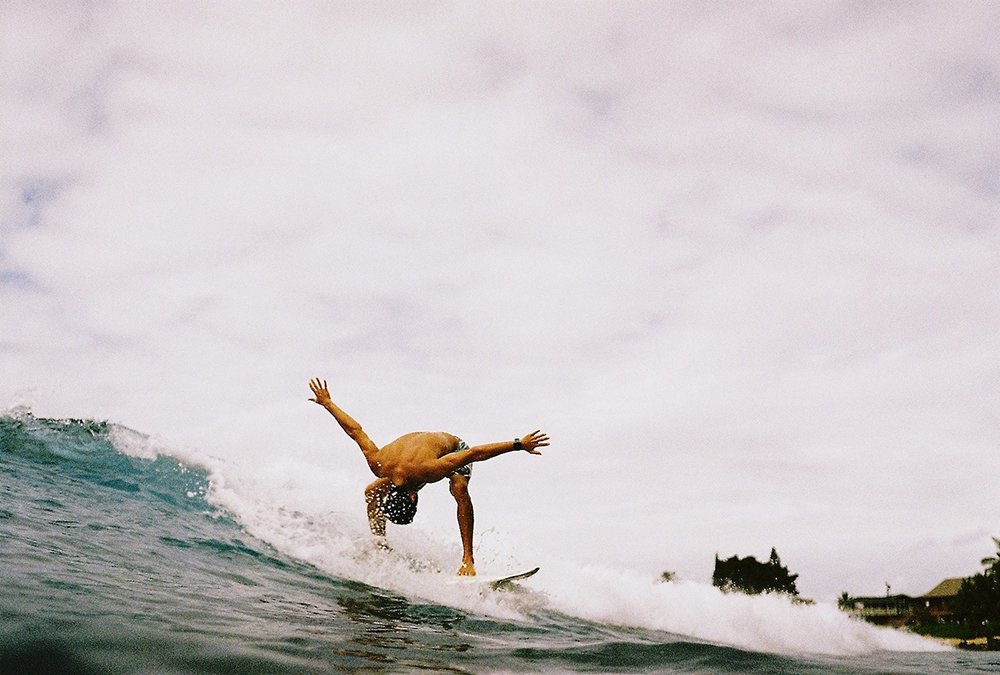A Visitor’s Guide To Surfing In Hawaii
Images Courtesy of John Hook
*Last year’s guide republished now in honor of the 2023 Vans Pipe Masters
This is a visitor’s guide to surfing in Hawaii, ironically written by me, a known advocate for abandoning the ocean pastime altogether.
I do not surf. In fact, I think that that shit is stupid. What then qualifies me to write this guide? I spent the first 26 of my 27 years of life in Honolulu, Hawaii. I am of Native Hawaiian descent and grew up in a surfing household. Consequently, I’ve developed a respect for surfing as a Native Hawaiian historical and cultural institution.
I will, however, acknowledge my lack of first-hand experience, having hardly ever surfed. So, what I’ve done is supplement this guide with advice, suggestions, pet peeves, and information from local surfers, pros, and lifeguards. While there are various surfing commandments—put forth by various shapers and bloggers, all of which with something to offer—Hawaii is a very particular place. So, this is a particular guide with particular info, all meant to keep you from doing something wrong and getting punched in the face. I have been punched in the face in cities all over the world, but none have been quite as concise or profoundly painful as a Hawaiian fist to the nose in the parking lot on the southeastern coast of Oahu. Everyone laughed. You don’t want that. Follow this guide.
1. Don’t come: This was the first thing everyone I consulted said: do not come. Not coming is the most beneficial and respectful thing you could do for surfing, Hawaii, and Hawaiians. This reflex answer comes from a storied and tragic history that has resulted in broadly negative sentiment toward visitors. It spans a series of issues and experiences too complicated to adequately explain here, but it was well summarized by one Native Hawaiian participant: ‘You are an uninvited guest in a very special and delicate place, the degradation of which is directly caused by the tourism industry, and so you should behave like a guest: with humility and the utmost respect for the environment and people.’ This quote effectively and efficiently emphasizes the importance of respect and humility, and really, that’s what all of these items boil down to—be respectful, be humble, and know your place. This isn’t your vacation spot, this is our home. It is finite and we are letting you have a piece. Don’t make us regret it.
2. If you must come, educate yourself: did you know that Hawaii was (and arguably, remains) a sovereign constitutional monarchy up until the illegal overthrow of the Hawaiian government by white businessmen in 1893? And did you know that prior to the overthrow, Hawaii was the most literate nation in the world? There is nothing that could better prepare you for your trip to Hawaii than taking time to understand the modern Hawaiian experience, which is directly tied to its history. Understanding Hawaii’s history will help you understand its culture, its people, and its context, and will help you to make better choices on your own. This is possibly the most important tip, as it does my job for me. It would be impossible to completely advise and inform would-be visitors—there is too much to say and my word count is too short (oh, how I’d love to make this list 30 items long). However, by taking the initiative and reading and getting a sense of the zeitgeist, you enrich yourself and can use this guide as a tool to lean on.
3. Take a lesson: If you’re a beginner, book a lesson with a beach boy. Do not just paddle out. Beach boys are experienced watermen who not only know how to surf, but how to surf. They will be able to provide you with extremely valuable information about method, safety, and etiquette. The beach boys are also revered cultural treasures imbued with an incredible amount of ocean knowledge, so even if you’re an experienced surfer, have a chat with them before paddling out.
4. Don’t touch the turtles: Don’t touch the seals, either. Actually, just don’t touch anything. Being within 10 feet of either could qualify as a federal violation, and if you’re seen touching, prodding, crowding, lying down next to, posing for Instagram with, or feeding them, you’ll likely get slapped with criminal prosecution, or worse, shamed on the internet and on local news. If you’re in the ocean and find yourself near a turtle or seal, move away from it as carefully as possible or risk a bloody nose. These animals are incredibly important to the Hawaiian people. Hawaii can be a violent place. Best not to fuck with the wildlife.
5. Skill level has nothing to do with it: No matter who you are, or how good you are, do not paddle out and start going. Float for a while. Get the lay of things, because each spot is different. You could be a local shredder at one spot and be a little high in the hierarchy, but go 100 yards away and you’re a nobody, back at the bottom. Even if you rip, you have to earn the right to be there, and you do that through humility and respect. Respect the lineup, the order, and let others go. Eventually, they will let you go, much like the etiquette of a skatepark. You aren’t a big tough ripper for getting a sunglasses sponsor, nor are you a soul surfer for longboarding 2-foot whitewash at Rockaway, so don’t act like it. No matter who you are or how good you are, at a new spot, you should be the very embodiment of patience and humility.
6. Don’t drop in (duh): This rule is fucking obvious, and yet it’s frequently broken in Hawaii. Visitors often think, ‘I’m only here for four days so I’m going as much as I can.’ No one cares. Be patient. The locals around you are there every day, have earned their place, and are there for different reasons. They aren’t in the vacation mindset like you, they have lives and worries. They aren’t there to rip—they’re there to clear their head, to escape the day’s struggle, connect with the ocean, their cultural heritage, and themselves. When you ruin that for them, you help to develop the sort of feelings that made the #1 piece of advice on this list: don’t come.
7. Ride the appropriate board for the spot: More than one person suggested this. I don’t know what this means, but I allowed consensus to decide the contents of this article so here it is. Here is an explanation that I find indecipherable, but I’m assured means something to surfers: ‘Don’t log at shortboard spots. If you do, don’t ever expect to get a good wave, let alone a set without getting burned or snapped at.’
8. Know your skill level: If the spot is bigger than you expected it to be, don’t go out. Should be obvious, but often the visiting mindset is, ‘I came here to surf Pipe so I’m going to fucking do it.’ Nah, man. You won’t be a legend—you’ll die. Or worse, you’ll force some poor hungover lifeguard to risk their life trying to rescue you, and chances are you don’t know how to be rescued right so you’ll panic and nearly drown the both of you, and then they’ll have to beat you unconscious in order to get you back to shore (this is a real thing that more than one lifeguard told me they had to do).
9. Leave no trace: Another obvious one that shouldn’t need to be said, and yet, sadly does. Do not leave your fucking trash on the beach, in the parking lot, or—god forbid—in the ocean. Do not leave your filth anywhere because in doing so, you are destroying the thing that you came to enjoy, a thing that does not belong to you. It is unforgivable. In fact, we’d recommend taking it a step further and making it a point to pick a piece of trash off the beach every time you paddle out and in. Invest in what you love. (side note: wear coral-safe sunscreen. Sun Bum probably offers that.)
10. Speak correctly: One time, as a teenager, I was on the beach and some haole dudes turned to us and said, ‘Aloha brahs!’ followed by some mocking Hawaiian gibberish. They all laughed. While they were paddling out, my friend broke into their rental car, peed on their clothes and stole their passports. Be respectful and friendly to everyone, even the kids. Say hello, say goodbye. Don’t cool guy anyone because trust me when I say, no one thinks you’re cool. Don’t be obnoxious out there, yelling and causing a ruckus like those dicks who throw tantrums and break their board at the skatepark. This is supposed to be fun relaxation time, not theatrical narcissism time, so be cool. Most important in the prevention of you being assaulted: do not, in any circumstances, ask someone, ‘Where’s your Aloha spirit?’ especially if you are being chewed out by someone. If you use that phrase, you will not survive that encounter. Best to just take the verbal assault and correct the behavior, because if that’s happening, it’s never for no reason.
11. Be aware: What are the waves doing, what are the locals doing, what am I doing? Where is the lineup order and where am I in it? Be aware of your surroundings, but also of the people around you. If you’re being vibed out, ask yourself why that may be. If you are not sure, it couldn’t hurt to ask (very very humbly and politely) what’s wrong. Something like, ‘Hey, I really don’t want to be in anyone’s way or come off like a dick, so if I am, let me know how I can do better. Thank you.’








